Pauline Studies Collection (10 vols.)
Digital Logos Edition
Overview
The Apostle Paul is the most notable Christian missionary and perhaps the most influential New Testament author. The greatest theologians in the church’s history—Augustine, Calvin, Luther, Karl Barth, and others—have repeatedly turned to Paul, and the central doctrines of the church hinge on the theology found in Paul’s writings. Yet in recent decades, disputes over the historicity of Paul’s letters and the emergence of the New Perspective have led scholars to reevaluate central Pauline texts, leading to controversy, dispute, and a fractured understanding of Paul’s intent.
The 10-volume Pauline Studies Collection brings you contributions from top Pauline scholars, who tackle the exegetical and interpretive challenges in Paul’s writings, as well as the historical and cultural context which informed them. This collection includes books on Romans and the Corinthian epistles, as well as lengthy treatments of Paul’s soteriology and the doctrine of justification found in Paul’s writings. And with the Logos edition, all Scripture references are linked to your Greek texts and English translations, giving you the tools you need for academic research, sermon preparation, or personal study. This collection is a vital addition to the libraries of New Testament scholars, pastors, students, and anyone interested in understanding the most significant developments in Pauline studies in recent decades.
This title is included in the following collections
You can save when you purchase this product as part of a collection.
2025 Collector's Edition Libra...
$10,999.99$8,249.99Logos 6 Collector's Edition Le...
$11,399.99$11,399.992025 Ultimate Library
$23,999.99$17,999.99

- Book-length exegesis and analysis of key Pauline texts, such as Galatians 2:11–14, Romans 6:1–11, 1 Corinthians 9, 2 Corinthians 3, 1 Corinthians 1–6, and 2 Corinthians 2:14–3:3
- Detailed analysis of Paul’s doctrine of justification, his soteriology, his mission, and his understanding of suffering
- Contributions from top evangelical scholars from around the world
- Title: Pauline Studies Collection
- Publisher: Paternoster
- Volumes: 10
- Pages: 3,332
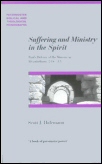
Suffering and Ministry in the Spirit: Paul’s Defense of his Ministry in 2 Corinthians 2:14–3:3
- Author: Scott Hafemann
- Publisher: Paternoster
- Publication Date: 2000
- Pages: 284
Shedding new light on the way Paul defended his apostleship, the author offers a careful, detailed study of 2 Corinthians 2:14–3:3 linked with other key passages throughout 1 and 2 Corinthians. Demonstrating the unity and coherence of Paul’s argument in this passage, the author shows that Paul’s suffering served as the vehicle for revealing God’s power and glory through the Spirit.
A book of persuasive power.
—Jerome Murphy O'Connor
Scott J. Hafemann (Th.D., Tübingen) is the Mary F. Rockefeller Distinguished Professor of New Testament at Gordon-Conwell Theological Seminary in South Hamilton, Massachusetts. Prior to joining the faculty of Gordon-Conwell, he served from 1995 to 2004 as the Gerald F. Hawthorne Professor of New Testament Greek and Exegesis at Wheaton College and Graduate School in Wheaton, Illinois. His books include an NIV Application Commentary on 2 Corinthians and The God of Promise and the Life of Faith: Understanding the Heart of the Bible. He is also the editor of Biblical Theology: Retrospect and Prospect, available as part of the IVP Evangelical Theology Collection.
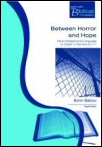
Between Horror and Hope: Paul’s Metaphorical Language of Death in Romans 6:1–11
- Author: Sorin Sabou
- Publisher: Paternoster
- Publication Date: 2006
- Pages: 159
This book argues that Paul's metaphorical language of death in Romans 6:1–11 conveys two aspects: horror and hope. The horror aspect is conveyed by the crucifixion language, and the hope aspect by burial language. The life of the Christian believer is understood, as relationship with sin is concerned (“death to sin”), between these two realities: horror and hope.
An important resource for scholars and preachers alike.
—Stephen Motyer
Sorin Sabou is Lecturer at Bucharest Baptist Seminary and Senior Pastor of the Romanian Baptist Church, Brasov, Romania.
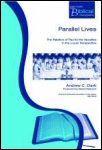
Parallel Lives: The Relation of Paul to the Apostles in the Lucan Perspective
- Author: Andrew C. Clark
- Publisher: Paternoster
- Publication Date: 1996
- Pages: 386
The study of the Peter-Paul parallels in Acts argues that their purpose was to emphasize the themes of continuity in salvation history and the unity of the Jewish and Gentile missions. In Parallel Lives, Andrew C. Clark sheds new light on Luke's literary techniques, partly through a comparison with Plutarch.
Crisp and methodological elucidation of the issues.
—Max Turner
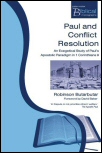
Paul and Conflict Resolution: An Exegetical Study of Paul’s Apostolic Paradigm in 1 Corinthians 9
- Author: Robinson Butarbutar
- Publisher: Paternoster
- Publication Date: 2007
- Pages: 300
The author sees the apostolic paradigm in 1 Corinthians 9 as part of Paul's unified arguments in 1 Corinthians 8–10 in which he seeks to mediate in the dispute over the issue of food offered to idols. The book also sees its relevance for dispute-resolution today, taking the conflict within the author's church as an example.
Convincing and well-researched exegesis of 1 Corinthians.
Robinson Butarbutar has served as a minister, theological lecturer and mission organizer in his homeland of Indonesia.
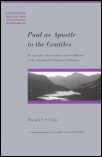
Paul as Apostle to the Gentiles: His Apostolic Self-Awareness and Its Influence on the Soteriological Arguments in Romans
- Author: Daniel Chae
- Publisher: Paternoster
- Publication Date: 1997
- Pages: 378
The author competently demonstrates that the equality of Jew and Gentile is the main subject matter of Paul's soteriological argument in his letter to the Romans. Chae argues that it is Paul's self-awareness of being an apostle to the Gentiles that has significantly influenced the shape, content and structure of his inclusive argument. Thus he offers an important alternative to the prevailing post-Holocaust interpretation of Romans and of Paul.
Daniel Chae received his Ph.D. from London School of Theology, where he was also Tutor and Research Fellow. He became the founding pastor of Eastbury Church, where he served until 2004. Since then, he has served as Director of MV DOULOS, a missionary community ship.
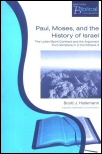
Paul, Moses, and the History of Israel: The Letter/Spirit Contrast and the Argument from Scripture in 2 Corinthians 3
- Author: Scott Hafemann
- Publisher: Paternoster
- Publication Date: 1996
- Pages: 497
Paul, Moses, and the History of Israel provides an exegetical study of the call of Moses, the second giving of the Law, the new covenant, Paul's self-understanding as an apostle, and the prophetic understanding of the history of Israel. Hafemann's work demonstrates Paul's contextual use of the Old Testament and the essential unity of the old and new covenants in view of the distinctive ministries of Moses and Paul.
Scott Hafemann has done an excellent job in presenting a correct understanding of the Spirit/letter contrast in 2 Corinthians 3. The conclusion that he reaches has implications for a whole understanding of the Old Testament and its relation to the New Testament.
—Online reviewer
Scott J. Hafemann (Th.D., Tübingen) is the Mary F. Rockefeller Distinguished Professor of New Testament at Gordon-Conwell Theological Seminary in South Hamilton, Massachusetts. Prior to joining the faculty of Gordon-Conwell, he served from 1995 to 2004 as the Gerald F. Hawthorne Professor of New Testament Greek and Exegesis at Wheaton College and Graduate School in Wheaton, Illinois. His books include Suffering and the Ministry of the Spirit, available as part of this collection; an NIV Application Commentary on 2 Corinthians; and The God of Promise and the Life of Faith: Understanding the Heart of the Bible. He is also the editor of Biblical Theology: Retrospect and Prospect, available as part of the IVP Evangelical Theology Collection.
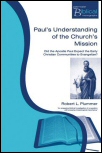
Paul’s Understanding of the Church’s Mission
- Author: Robert L. Plummer
- Publisher: Paternoster
- Publication Date: 2006
- Pages: 190
Did the apostle Paul expect the early Christian communities to evangelize?
This book engages in a careful study of Paul’s letters to determine if the apostle expected the communities to which he wrote to engage in missionary activity. It helpfully summarizes the discussion on this debated issue, judiciously handling contested texts, and provides a way forward in addressing this critical question.
While admitting that Paul rarely explicitly commands the communities he founded to evangelize, Plummer amasses significant incidental data to provide a convincing case that Paul did indeed expect his churches to engage in mission activity. Throughout the study, Plummer progressively builds a theological basis for the church’s mission that is both distinctively Pauline and compelling.
Plummer's call for reliance on the Word of God and the power of the gospel is refreshing…
—Online reviewer
Robert L. Plummer is Assistant Professor of New Testament Interpretation, The Southern Baptist Theological Seminary, Louisville, Kentucky, USA.
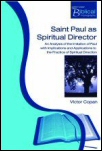
Saint Paul as Spiritual Director: An Analysis of the Imitation of Paul with Implications and Applications to the Practice of Spiritual Direction
- Author: Victor Copan
- Publisher: Paternoster
- Publication Date: 2007
- Pages: 350
In recent years much has been written on spiritual direction. However, confusion and at times outright contradiction exists between the aims and methodologies of various models of Christian spiritual direction. In order to develop solid criteria for evaluating and critiquing these models it is necessary to root the practice of spiritual direction in the biblical record. The intention of this study is to provide such biblical moorings by examining the Apostle Paul as a case study in his function as a spiritual director—with respect to his aims and praxis of spirituality forming the members of the congregations he founded.
Victor Copan is Associate Professor of Ministry, Palm Beach Atlantic University, Florida.
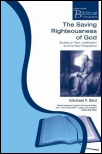
The Saving Righteousness of God
- Author: Michael Bird
- Publisher: Paternoster
- Publication Date: 2005
- Pages: 250
This book presents a series of studies on contentious aspects of Paul's doctrine of justification including the meaning of righteousness, the question of imputation, the role of resurrection in justification, an evaluation of the New Perspective, the soteriological and ecclesiological significance of justification, justification by faith with judgment according to works, and debates over the orthodoxy of N. T. Wright. The burden of the volume is to demonstrate that both Reformed and new readings of Paul are indispensable to attaining a full understanding of Paul's soteriology.
Michael Bird's treatment is a calm, judicious and irenic voice which ought to be heard widely.
Michael F. Bird is New Testament Lecturer, Highland Theological College, Dingwall, Scotland.
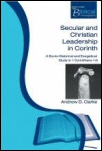
Secular and Christian Leadership in Corinth: A Socio-Historical and Exegetical Study of 1 Corinthians 1–6
- Author: Andrew D. Clarke
- Publisher: Paternoster
- Publication Date: 2006
- Pages: 188
This volume is an investigation into the leadership structures and dynamics of first-century Roman Corinth. These are compared with the practice of leadership in the Corinthian Christian community which are reflected in 1 Corinthians 1–6, and contrasted with Paul's own principles of Christian leadership.
Andrew D. Clarke is Senior Lecturer in New Testament, Department of Divinity with Religious Studies, University of Aberdeen, Scotland, UK.